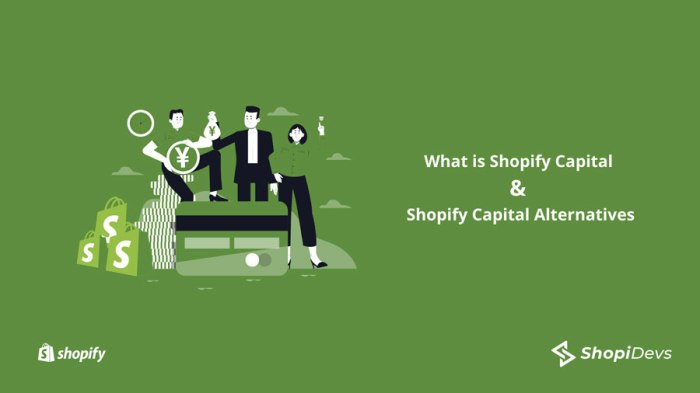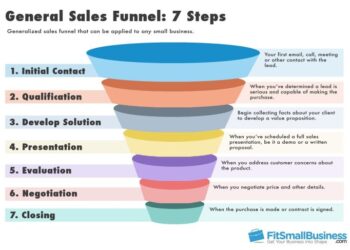Starting with “Shopify Capital Loan Alternatives for Small Business Owners,” the discussion unfolds with a focus on exploring various financing options beyond traditional avenues. This comprehensive guide aims to shed light on alternative funding sources for small business owners, offering valuable insights and tips along the way.
As we delve deeper into the realm of small business financing, it becomes evident that considering alternative solutions to Shopify Capital Loans can open up new possibilities and avenues for growth.
Introduction to Shopify Capital Loans Alternatives

Shopify Capital Loans are financial solutions offered by Shopify to help small businesses grow and expand by providing them with quick access to capital.
It is essential for small business owners to explore alternative funding options apart from Shopify Capital Loans to ensure they are making the best financial decisions for their business.
Benefits of Considering Other Options
- Shop around for better interest rates and terms to save money in the long run.
- Diversify your funding sources to reduce dependency on a single lender.
- Access to different types of loans tailored to specific business needs, such as equipment financing or lines of credit.
- Opportunity to build relationships with multiple lenders for future financial needs.
Traditional Bank Loans

When considering financing options for small businesses, traditional bank loans are often one of the first choices that come to mind. Let's explore how traditional bank loans compare and contrast with Shopify Capital Loans for small business owners.
Eligibility Criteria
- Good credit score: Traditional banks typically require a higher credit score compared to Shopify Capital Loans.
- Collateral: Banks may require collateral to secure the loan, while Shopify Capital Loans are often unsecured.
- Business history: Banks may prefer established businesses with a track record of revenue, while Shopify Capital Loans may be more accessible to newer businesses.
Application Process and Approval Timeline
- Application process: Traditional bank loans usually involve a more complex application process, including detailed financial documentation and business plans.
- Approval timeline: Banks may take longer to approve and disburse funds compared to the quick turnaround offered by Shopify Capital Loans.
- Personal guarantee: Banks may require a personal guarantee from the business owner, adding an extra layer of risk.
Online Lenders
When considering alternatives to Shopify Capital Loans, small business owners often turn to online lenders for financial support. Online lenders offer a convenient way to access funding quickly without the extensive paperwork and stringent requirements of traditional banks.
Popular Online Lenders
- OnDeck
- Kabbage
- Funding Circle
- BlueVine
Advantages and Disadvantages
Online lenders provide faster approval processes and funding compared to traditional banks. They also tend to have less strict requirements, making it easier for small businesses to qualify for a loan. However, these loans often come with higher interest rates and fees, which can increase the overall cost of borrowing.
Tips for Finding Reputable Online Lenders
- Check online reviews and ratings from other small business owners.
- Verify the lender's credentials and accreditation.
- Compare interest rates, fees, and repayment terms from multiple lenders.
- Avoid lenders with hidden fees or unfavorable terms.
- Seek recommendations from trusted sources, such as financial advisors or business owners in your network.
Small Business Grants
Small business grants are funds provided to small business owners that do not need to be repaid, unlike loans. These grants are typically awarded by government agencies, non-profit organizations, and private companies to help small businesses start or expand their operations without taking on debt.
Sources for Small Business Grants
- Government Grants: Federal, state, and local government agencies offer various grant programs to support small businesses in different industries and sectors.
- Non-Profit Organizations: Many non-profit organizations focus on providing financial assistance to small businesses through grant programs.
- Private Companies: Some private companies also offer grants as part of their corporate social responsibility initiatives to support small business growth.
Application Process and Requirements
- Research Grants: Start by researching available grants and their specific eligibility criteria to determine which ones align with your business needs.
- Prepare Documentation: Gather all necessary documents, including business plans, financial statements, and other supporting materials required for the grant application.
- Submit Application: Follow the application instructions provided by the grant provider and submit your application before the deadline.
- Wait for Approval: Once you have submitted your application, you will need to wait for the grant provider to review and make a decision on your request.
- Comply with Grant Terms: If your grant application is approved, make sure to comply with the terms and conditions set by the grant provider to receive the funds.
Crowdfunding
Crowdfunding can be a viable alternative for small business financing as it allows entrepreneurs to raise funds from a large number of people who are interested in supporting their business idea. It provides an opportunity to showcase the business concept and attract investors who believe in the project.
Different Crowdfunding Platforms
- Kickstarter: One of the most popular crowdfunding platforms, Kickstarter allows businesses to present their projects to a global audience and receive funding in exchange for rewards or early access to products.
- Indiegogo: Another well-known platform, Indiegogo offers flexible funding options where businesses can keep the funds raised even if the target amount is not reached.
- GoFundMe: While commonly used for personal fundraising, GoFundMe also supports small business campaigns, allowing entrepreneurs to share their stories and receive donations from supporters.
Tips for a Successful Crowdfunding Campaign
- Set a realistic funding goal: Make sure to calculate the exact amount needed for the project to avoid falling short or asking for too much.
- Create a compelling story: Engage potential backers by sharing the journey behind the business idea, the problem it solves, and the impact it can make.
- Offer attractive rewards: Incentivize backers by providing appealing rewards, such as exclusive products, behind-the-scenes access, or personalized experiences.
- Utilize social media and networking: Leverage social media platforms and personal connections to reach a wider audience and promote the crowdfunding campaign.
Conclusion
In conclusion, the landscape of small business financing is vast and diverse, with a multitude of options available to entrepreneurs. By exploring alternatives to Shopify Capital Loans, small business owners can discover innovative ways to fund their ventures and propel them towards success.
FAQ Overview
What are the main differences between traditional bank loans and Shopify Capital Loans?
Traditional bank loans typically have stricter eligibility criteria and longer approval timelines compared to Shopify Capital Loans, which offer more flexibility and quicker access to funds for small business owners.
How can small business owners find reputable online lenders for financing?
Researching online lender reviews, checking for accreditation, and comparing terms and rates can help small business owners identify reputable online lenders for their financing needs.
What sets crowdfunding apart as a financing option for small businesses?
Crowdfunding allows small business owners to raise capital from a large pool of individuals who believe in their vision, offering a unique way to fund projects without traditional loans or grants.











